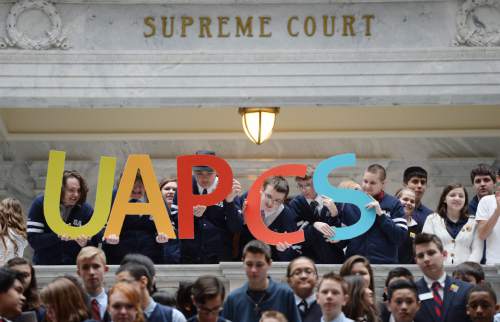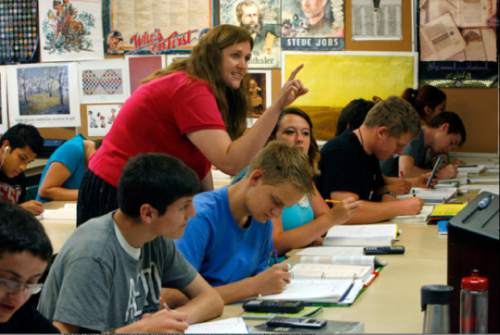This is an archived article that was published on sltrib.com in 2015, and information in the article may be outdated. It is provided only for personal research purposes and may not be reprinted.
Charter schools are public schools, overseen by unelected boards at the local and state level.
That could change if lawmakers adopt recommendations approved Friday by the Utah Board of Education.
Currently, a state charter school board provides oversight for the alternative schools, with members of that board appointed to four-year terms by the governor.
The division of power has led some to criticize Utah for running competing public education systems, and to accuse the charter board of rubber-stamping school administrators.
State school board members voted Friday to recommend that the board be given power to appoint and remove members of the charter board, and to select the charter board's chairman.
The move is intended to bring charter schools back under the purview and direction of the Utah Board of Education, according to board member Linda Hansen.
"They come under public education so they should be under our umbrella," Hansen said. "I'm not sure that's where they see themselves."
Howard Headlee, chairman of the charter board, said the Board of Education's arguments are superficial, personal and in some cases petty.
"The discussion today was indicative of just how much the state board has on their plate," Headlee said, "and their inability to really understand the details of many of the things that they're doing."
Board of Education member Laura Belnap said that's because the charter board is acting too independently. "I'm feeling like I'm not able to do my constitutional duty because I don't really know what's going on," she said. "I feel like I've deferred it to another group — a parallel board."
Hansen said the Board of Education was asked by lawmakers to review and make recommendations regarding charter school governance.
She said the charter board had also looked at potential changes to its structure.
"I think this is something that probably will come up during the legislative session and [lawmakers] would like to have us weigh in on," she said.
But Headlee denied that claim. He said the charter board was shut out of the state school board's review of charter governance, and the charter board has at no point discussed governance changes or potential legislation.
"I'd have to characterize that as complete, unfounded paranoia," he said. "I think there are people on the state school board who are jumping at shadows."
Board of Education member Jefferson Moss voted against the recommendation to move the charter board under the appointment authority of school board members.
He said charters are designed to be laboratories of innovation, and the distinct governance systems provides flexibility for experimentation.
"I personally like the fact that there is a little bit of a disconnect there," he said.
Headlee was confident that through further debate, the board's recommendations would not be seen as in the best interest of the state's children.
He was alarmed by what he called "aggressive overreach" by the Board of Education, particularly the suggestion that charter board members would not be able to select their own chairman.
"There are some that might suggest that kind of appetite for control is not healthy," he said.
Charter schools have come under scrutiny lately. A report released Wednesday by the Utah Auditor's Office found that charters were more prone to financial reporting errors than their school district counterparts.
And charter schools have lower rates of teacher retention and compliance with reporting requirements, according to a March review of schools by the state charter school board.
In August, two charter schools shut down after termination procedures were initiated by the state charter board. The board's decision was criticized for its timing and transparency, with students forced to transfer schools without warning as the school year began.
Twitter: @bjaminwood





